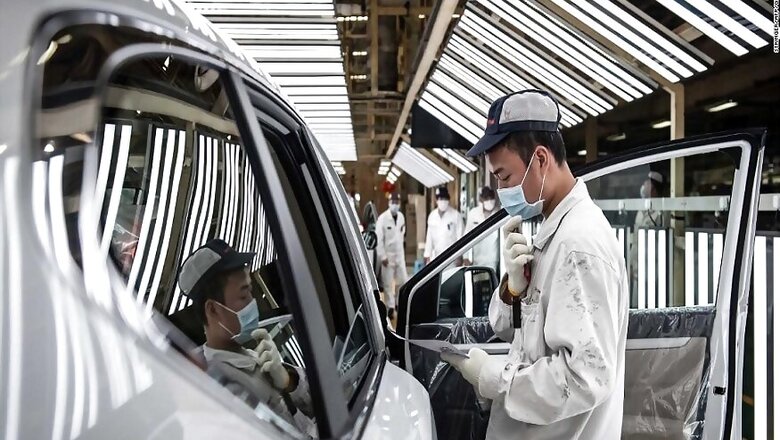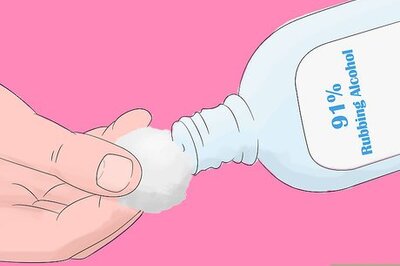
views
Beijing: China's GDP took the worst hit since the disastrous Cultural Revolution in 1976, plummeting by 6.8 per cent in the first quarter of 2020 as the country took unprecedented measures to fight the coronavirus pandemic that brought the world's second largest economy to a standstill.
China's gross domestic product stood at 20.65 trillion yuan (USD 2.91 trillion approx) in the first quarter of 2020 amid the COVID-19 impact, down 6.8 per cent year on year, China's National Bureau of Statistics (NBS) said on Friday.
The figure slightly rebounded from a drop of 20.5 per cent in the first two months, the NBS data said. On a slowdown mode, China's economy grew by 6.1 per cent in 2019, the lowest annual growth rate in 29 years amid the bruising trade war with the US but it remained above the psychologically important mark of six per cent.
The GDP in 2019 expanded to USD 14.38 trillion from USD13.1 trillion in 2018. But the coronavirus which devastated China and the world ever since it broke out in Wuhan in December last year has dealt a major blow to the Chinese economy which was already in a slowdown mode in the last few years due to steady shrinking of its exports markets.
As China shut down central Hubei province, home for over 56 million people, and its capital Wuhan for over two months since January 23 to contain the virus for over two months, the entire country came to a standstill to prevent the COVID-19 from spreading across the world's most populous nation. The world's second-largest economy is now limping back to normal with factories resuming production all over.
Hong Kong-based South China Morning Post reported that the 6.8 per cent drop in the first quarter of 2020 is the first contraction since the end of Cultural Revolution spearheaded by the ruling Communist Party founder Chairman Mao Zedong in 1976 which had caused extensive damage to the fledgling Chinese economy then.
Its goal was to preserve Chinese Communism by purging remnants of capitalist and traditional elements from Chinese society, and to re-impose Mao as the dominant ideology in the Community Party of China.
New data released by the NBS confirmed the slump due to the COVID-19 which was worse than predictions of minus 6.0 per cent from a survey of analysts, the Post report said. The NBS data also showed that over the single month of March, the economy remained under huge pressure, with the industrial sectors, retail and fixed asset investment all shrinking again, following a collapse over the first two months of the year.
Releasing the figures to the media here, the NBS however said the country's economic and social development witnessed overall stability in Q1. A breakdown of the data showed output of the service sector, which accounted for nearly 60 per cent of the total GDP, dropped by 5.2 per cent, while primary industry and the secondary industry saw a decline of 3.2 per cent and 9.6 per cent, respectively.
"The situation of epidemic control and prevention continued to improve with a basic interruption in epidemic transmission at home," the NBS said, adding that the resumption of work and production has accelerated and fundamental industries are growing steadily, state-run Xinhua news agency reported.
Friday's data showed China's job market improved slightly in March, with the surveyed unemployment rate in urban areas standing at 5.9 per cent, down 0.3 percentage points from the previous month, it said.
China's retail sales of consumer goods, a major indicator of consumption growth, declined 19 per cent year on year in the first quarter of this year hit by the coronavirus outbreak, the NBS report said.
NBS spokesperson Mao Shengyong played down the decline, saying that the economy is expected to perform better in Q2 with accelerated work and production resumption and more stronger policy measures put in place to boost the economy.
Citing a 1.2-per cent growth forecast for China's GDP by the International Monetary Fund (IMF), Mao said China would be one of the few positive readings for the world's major economies. China is yet to announce its annual GDP target for the year along with other key targets for inflation, unemployment and the fiscal deficit at the "two sessions," the annual meetings of national lawmakers and political advisors, which were postponed due to coronavirus epidemic, state-run Xinhua news agency reported.
To further bolster the economy, China has pledged to appropriately raise the fiscal deficit ratio, issue special treasury bonds, increase the scale of special bonds for local governments and guide the interest rate to decline in the loan market. Beijing has also signalled plans to announced a significant economic stimulus to help economic recovery, which the state-run People's Daily said would "expand domestic demand".
Analysts say that the Covid-19 crisis could significantly dent China's hold on the global supply chain. China has unveiled a range of financial support measures to cushion the impact of the slowdown, but not on the same scale as US which had announced a USD two trillion package.
"We don't expect large stimulus, given that that remains unpopular in Beijing. Instead, we think policymakers will accept low growth this year, given the prospects for a better 2021," Louis Kuijs, an analyst with Oxford Economics told BBC. Since March, China has slowly started letting factories resume production and letting businesses reopen, but this is a gradual process to return to pre-lockdown levels.


















Comments
0 comment